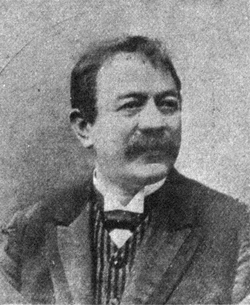Benno Straucher | |
|---|---|
 Straucher, photographed in or before 1907 | |
| Reichsabgeordneter | |
| In office 1897–1919 | |
| Constituency | Czernowitz |
| Member of the Chamber of Deputies of Romania | |
| In office May 27, 1920 – June 1926 | |
| Constituency | Czernowitz ("Cernăuți-city") |
| In office June 14, 1927 – June 1931 | |
| Personal details | |
| Born | August 11, 1854 Rohozna, Duchy of Bukovina |
| Died | November 5, 1940 (aged 86) Chernivtsi (Czernowitz, Cernăuți), Ukrainian SSR |
| Nationality | Austro-Hungarian (to 1918) German Austrian (1918–1919) Romanian (from 1920) |
| Political party | Independent (1882–1904, 1918–1940) Progressive Peasants' Fellowship (1904) Jewish National People's Party (1906–1918) |
| Profession | Lawyer, journalist |
Benno or Beno Straucher (Yiddish: בענאָ שטרױכער; August 11, 1854 – November 5, 1940) was a Bukovina-born Austro-Hungarian lawyer, politician and Jewish community representative, who spent the final part of his career in Romania. A Jewish nationalist influenced by classical liberalism and Zionism, he first held political offices in Czernowitz city. After 1897, he was one of the noted Jewish representatives in the Austrian Parliament's upper chamber (Abgeordnetenhaus). Straucher, who was instrumental in creating the reformist Progressive Peasants' Fellowship, maintained his Abgeordnetenhaus seat throughout the remainder of Austria-Hungary's existence. From 1906, he led the Jewish National People's Party locally and helped establish the pan-Austrian Jewish National Party. He vied for political direction over the Bukovina Jews with several other groups, most notably the Zionist People's Council Party of Mayer Ebner, who became his personal rival.
Straucher supported maintaining tight connections between Jews and Bukovina Germans while endorsing a personal version of Jewish autonomism and Yiddishism. He was a Habsburg loyalist up to the final stages of World War I, and then supported Bukovina's attachment to a "German Austria". Upon the region's incorporation into Greater Romania, he began cooperating with the larger Union of Romanian Jews. Forming successive alliances with the People's Party and the National Liberal Party, he also served two non-consecutive terms in the Romanian Chamber of Deputies. Despite such moves, and although he endorsed a version of Jewish assimilation, Straucher made himself known as a strong critic of Romanianization measures.